Bosch dishwasher repair: decoding error codes, causes and troubleshooting
It is not necessary to repair Bosch dishwashers under warranty on their own. It is better to notify the service center about the situation and wait for the wizard to arrive from there and fix all the problems.
If the warranty period has expired, you can try to fix some problems with your own hands, having previously determined the causes and the location of the malfunction using the alphanumeric code. And what kind of fault does this or that code correspond to and what steps can be taken in a specific situation? We will talk about this in detail in our article.
The content of the article:
Common Error Codes
The latest lines of kitchen appliances of the German concern are equipped with a progressive self-diagnosis system. It monitors the correct functioning of the devices, and all Bosch dishwasher error codes are immediately displayed on the LCD in the form of an alphanumeric abbreviation.
Typical malfunctions, which are considered characteristic of Boshevsky units, are indicated by the English letter "E" and one or two digits. This facilitates the troubleshooting process, allows you to understand what exactly happened to the equipment and how to fix this situation.
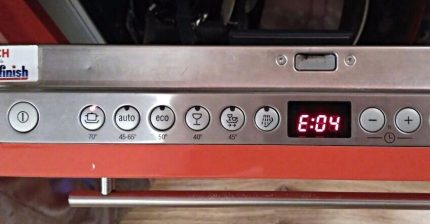
In some models, instead of the letter “E”, “F” is used, and the digital indicator remains the same.
Code Group # 1 - Water Heating Complications
E01 indicates damage to the heating element or a violation of the structural integrity of the heater circuit. Most likely, this element burned out, and for further correct operation it is required replacement of TEN. At the same time, you should check the temperature sensor and make sure that it is able to provide reliable information.
E2 sometimes alternately with E01 pops up on the home screen. Usually this indicates that the internal water temperature sensor is faulty. In this embodiment, the heater will operate at full power, as indicators of the level of heating will not be able to enter the control unit. If the problem is not resolved in time, the problem will cause the heater to overload and cause it to burn out.
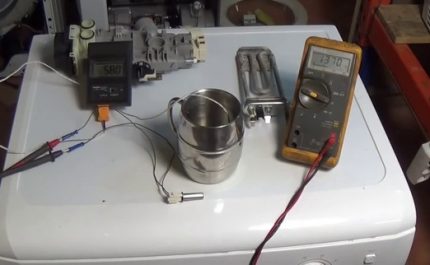
E09 signals problems with the flow heater. Most often, this error is recorded by models with a heating element located deep in the circular pump. To solve the problem, it is necessary to conduct a detailed diagnosis of the heating element using a multimeter. If the resistance is at zero, the heater will need to be replaced.
E11 says that the temperature sensor does not receive power, for example, due to a communication failure between it and the control module.
Several reasons provoke this at once, so the user will have to check for damage to such nodes as:
- working contacts of the temperature sensor;
- wiring from the temperature sensor;
- contact elements of the control module.
When visually detecting problem areas, the machine will need to be disconnected from the power supply and only then proceed with troubleshooting.
E12 is displayed on the display of the dishwasher at the moment when the heating element is overloaded as a result of the subsidence of a large amount of dirt on it or the occurrence of scale. After rebooting the dishwasher, the code sometimes changes to E09, but, regardless of the numbers, it indicates the same problem.
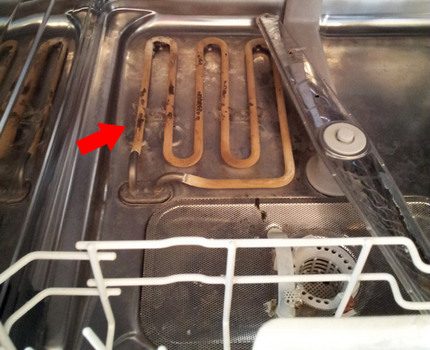
During repair work, it is necessary to strictly observe the basic safety rules and be sure to disconnect the device from the power supply to avoid personal injury and burns.
Code Group # 2 - Blockage Issues
The formation of various kinds of blockages is a weak point in all respects for Bosch reliable and high-quality kitchen washing equipment. These unpleasant moments happen, as a rule, due to the fault of users who neglect to remove food residues from the dishes before loading them into the washing unit.
E7, highlighted on the display, stands for "the inability to pump water from the tank as a result of clogging of the drain hole."
There may be several reasons for this situation, for example:
- improperly laid dishes;
- an object blocking the water outlet;
- clogging of the drain with food residues, fatty deposits.
To eliminate the error code, it is enough to fold the dishes more neatly, remove objects that are potentially capable of blocking the hole for draining water, and clean the surrounding area from anything that interferes with the outflow of liquid. After these actions, the unit will work again in normal mode.
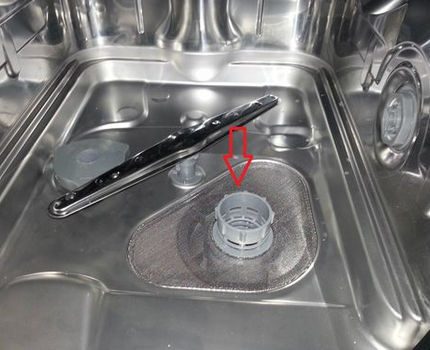
E22 usually indicates contamination of one of the unit’s internal filters. In this case, clogged filters must be replaced with new ones. The same code is sometimes displayed when there is a problem with the drain pump, for example, in the case of a decreased impeller rotation speed. A deeper diagnosis is required here, similar to troubleshooting E21.
Error with code E24 for dishwashers of the Bosch brand, it stands for kink, crease or clogging of the drain hose, pollution of the sewer drain or overlapping of the drain outlet at the siphon. The causes can be very different, and often this abbreviation arises in parallel with E22.
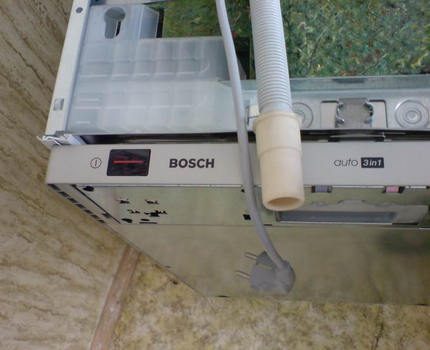
Eliminating the problem of such a plan is not difficult. Simply visually detect one of the above problems and fix it yourself or with the help of a service center employee.
E25 gives a signal that food waste and other waste elements that impede the passage of water have accumulated in the pipe section of the pump or in the base of the drain hose. As a result, the pump power decreased, and he lost the ability to fully divert the used liquid to the drain.
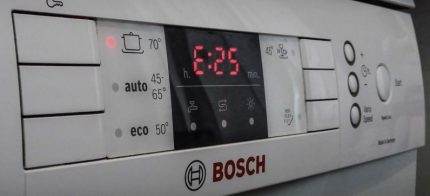
The following situation - the corresponding sensors caught the problem and sent the data to the control unit of the unit. As a result, the abbreviation lit up on the display. E25, and the dishwasher ceased to fulfill its direct functions.
To eliminate the malfunction, it is necessary to disconnect the device from the power supply and water supply system, carefully clean the pipe and drain hose from sediment and blockages, while simultaneously checking the pump's wing element for entanglement with foreign waste elements.
A video with instructions for fixing error 25 will help independent masters cope with the task:
Code group # 3 - problems with water collection / discharge
E3 it stops the machine when, within the framework of a given program, it is not possible to draw water into the chamber for the allotted period of time. In the latest Bosch models, in this situation, self-draining of the working fluid is first carried out, and only then an alphanumeric trouble code appears on the screen.
In products without display, released 7-10 years ago, the process is the opposite. If the Bosch dishwasher displays an error "Crane", first the problem is solved, and then the tank is filled with liquid.
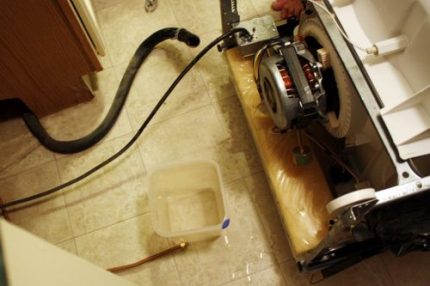
To solve the problem, it is required to check the presence of water in the central supply system. If everything is okay with this, you should pay attention to the filters located at the entrance to the dishwasher directly in front of the inlet hose and establish the correct operation of the valve and water level sensor. In the end, you can see how the pump works, because sometimes it is it that provokes the appearance of the E3 error code on the screen.
E5 gives a clear signal that the unit tank is full of water. This happens when the water level sensor fails and cannot stop the filling process at the right time. To eliminate the problem, it is necessary to carefully inspect the sensor and find out if its tube is clogged with dirt and food debris, if the working contacts are melted and if the wiring is burned out.
If everything is fine with the indicated nodes, it is worth dealing with the filler valve. Perhaps, for some reason, it cannot completely close and block access to the tank.
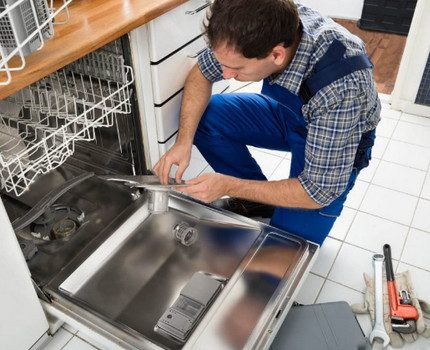
E8 in many ways it is similar to the E3 error and behaves exactly the same way - the dishwasher does not collect the required amount of water into the pan. Because of this, the circular pump cannot turn on correctly, and the heating element loses its ability to join the work. The search for the causes of the malfunction is carried out according to the principle described for the E3 code.
E16 indicates the inability of the equipment to block the access of fluid to the washer reservoir. Water is poured into the car uncontrollably, contrary to the established regime. Typically, this situation is triggered by the entry of debris into the intake valve. Large particles do not allow the partition to close tightly, and water continues to seep inside even with the machine inactive.
To fix the problem, carefully inspect the filling valve, remove large particles of dirt and clean the surrounding area. Then you need to check the health of the water level sensor and find out if there is any excess foam from the detergent in the tank.
E17 signals that the dishwasher is not filling properly with water. This type of error is more rare and narrow-profile. Usually this is due to the inlet valve, with a large force blocking the water or not able to close at all due to excessive fluid pressure. Then you need to partially block the water on the riser pipes, in this way reducing the total pressure in the system.
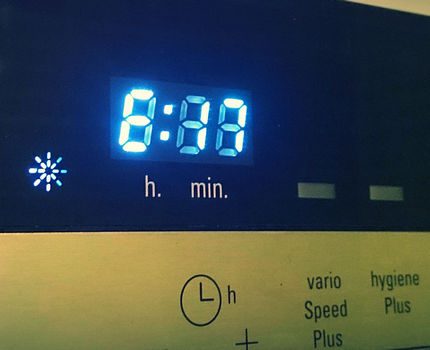
Sometimes the appearance of the E17 code is provoked not by mechanical problems, but by failures of a completely different nature, for example, water hammer.
If the malfunction is not detected, it is appropriate to check the sensor, which measures the amount of water supplied to the tank. Perhaps the problem lies precisely in it and specifically this element is the reason for the appearance of the E17 code on the screen.
E21 draws the user's attention to the fact that the pump of the machine stops working correctly, preventing the unit from draining the water in a timely manner. A situation is created when the power to the pump comes in full, interaction with the control unit and sensors occurs in normal mode, but drainage is not carried out and water remains in the tank.
In search of a problem, it is worth checking the impeller. Perhaps it stopped rotating due to the fact that some foreign elements were wound on the base or blades and jammed the correct movement. Or the rotor adhered to the walls of the sleeve, and it must be well cleaned and greased. Sometimes this is evidenced by a change in the error code value from E21 to E22.
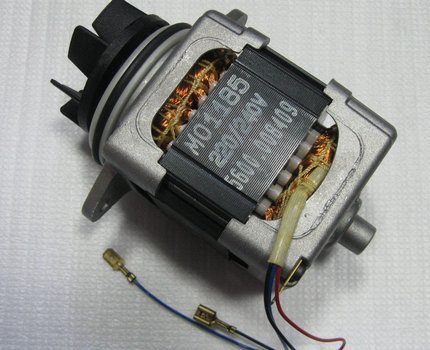
But most often the problem is the operational wear of the pump mechanism, which interferes with the pumping / pumping of working water. The solution is simple - you need to remove the old pump and replace it with a new one.
Code Group # 4 - Electrical Failures
The electrical system of modern Boshevsky units consists of a large number of various sensors and fittings. One burned-out terminal or frayed short wiring create a lot of difficulties and make the screen glow with different error codes.
E01 and E30 talk about failures in electrical or electronic systems. The easiest solution is to restart the unit through the on / off activation button. If the error indication disappears, it means that an elementary failure has occurred and operation can continue in normal mode.
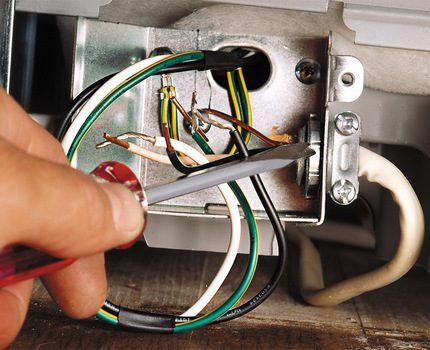
When the error codes repeatedly continue to be displayed, you must contact the service center and invite a qualified craftsman to your home. He will carry out diagnostics with the help of special devices, identify and eliminate the detected problems.
E27 usually “pops up” in those machines that are directly connected to the electrician. The abbreviation appears on the screen after voltage surges that have occurred on the network. If the code becomes a frequent occurrence, it is worth buying stabilizer and connect the dishwasher through it, thus protecting the unit from a possible circuit.
Code Group # 5 - Breakdowns of Switches and Sensors
Sensors and water switches help control the operation of the dishwasher and control the execution of various programs. When these parts break down, the internal diagnostic system recognizes this and displays error codes describing the problems on the display.
E4 reports that the control sensor, which is responsible for the pressure and flow of water flowing into the sprayer, does not cope with its functions. The reason lies in a mechanical malfunction or blockage. Perhaps too hard running water clogs the nozzles and no fluid flows through them. Cleaning pass-through elements or replacing a sensor usually solves this issue.
E6 draws attention to the incorrect operation of the water purity sensor. Sometimes the situation can be remedied by replacing burned-out contacts, but more often than not, an element simply has to be replaced with a new one.
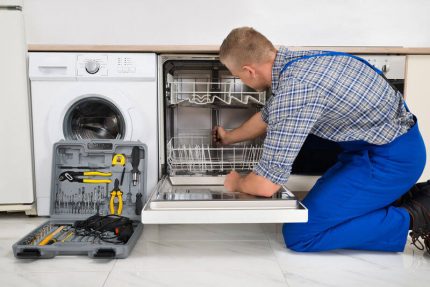
E14 signals a malfunction of the sensor responsible for the amount of water entering the dishwasher tank. It is not advisable to change or repair it yourself. Let an employee at the Bosch service center invited to your home do it,
Error with code E15 Bosch’s dishwasher indicates that the Aquastop integrated system is malfunctioning and the sensor is detecting leaks. In this case, you need to inspect the unit pan, hoses and adjacent elements to detect a problem area. When it is found, the problem can only be eliminated by replacing or repairing the failed part. We recommend that you familiarize yourself with information on where to look and how to choose quality parts for dishwashers.
The video presents what the error E15 means in the Boshevian dishwashers, and briefly explains how to eliminate the problem and restore the machine to working:
Key Causes of Common Faults
Even such reliable equipment as Bosch can fail for completely banal, everyday reasons, for example, due to loading excessively dirty dishes into the washing chamber. Food debris washed away by the flow of water will clog the filter and cause clogging.

To avoid this situation, it is better to first clean the food left on the plates, and only then put them in the car.
Bad effect on the dishwasher incorrect connection to the mains and a faulty outlet. Too long a drain hose or poor-quality fastening in the water supply area can also create problems, so installation and installation should be entrusted to professionals.
If the home master wants to do it yourself, you must clearly follow assembly instructions and strictly observe the requirements prescribed by the manufacturer in the passport attached to the unit.
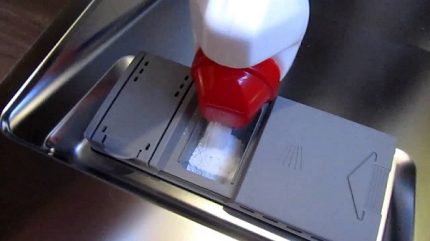
A lot of inconvenience, and as a consequence of problems, is created by improper loading of dishes in the washing chamber. Many users do not pay attention to this item and then encounter various problems.
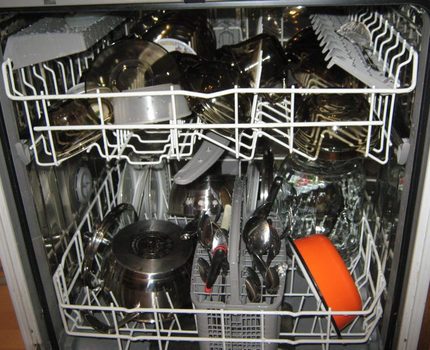
Before loading plates, cups and appliances, you must carefully study instructions for loading dishes and take into account all the wishes put forward by the manufacturer of the equipment.
Dishes placed correctly will be perfectly washed and will not require any additional actions from the hostess. At the same time, the machine will not feel overload and will serve perfectly throughout the entire operational period.
We recommend that you familiarize yourself with operating rules Bosch dishwashers in order to avoid problems in the future in connection with their violation.
Conclusions and useful video on the topic
Video about typical dishwasher faults and how to deal with them:
How to repair a Bosch dishwasher at home that has stopped pouring water. A detailed layout of the process in steps. Useful tips and tricks from an experienced wizard.
In the Bosch brand dishwasher, the circular pump failed. The video will tell you what to do in this case: a way to disassemble the unit to quickly fix the problem:
Bosch dishwasher technology is reliable and works great throughout the entire operating period. Breakages and malfunctions most often occur in it due to user actions.
To avoid these points, you should be more careful about the device and regularly carry out preventive measures. If a problem occurs, you can try to fix it yourself or contact a service center and entrust the work to professionals.
Want to talk about your Bosch brand dishwasher repair experience? Or do you want to supplement our material with information that we did not mention in this publication? Write your additions, comments and recommendations in the block below the article.

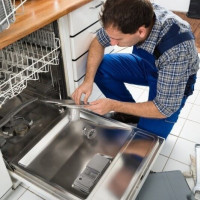 Repair of dishwashers Electrolux at home: typical malfunctions and their elimination
Repair of dishwashers Electrolux at home: typical malfunctions and their elimination 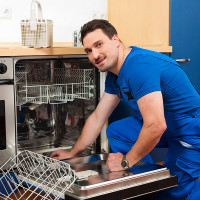 What to do if the dishwasher does not drain the water and costs: decoding error codes
What to do if the dishwasher does not drain the water and costs: decoding error codes 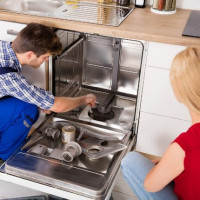 DIY repair of the dishwasher: analysis of breakdowns and errors + nuances of elimination
DIY repair of the dishwasher: analysis of breakdowns and errors + nuances of elimination 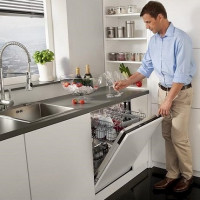 Tank of the dishwasher: causes and options for breakdowns + ways to eliminate them
Tank of the dishwasher: causes and options for breakdowns + ways to eliminate them 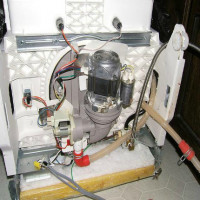 Spare parts for dishwashers: types, where to look and how to choose good ones
Spare parts for dishwashers: types, where to look and how to choose good ones 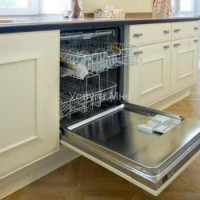 Samsung dishwasher rating: review of the 10 best models on the market
Samsung dishwasher rating: review of the 10 best models on the market 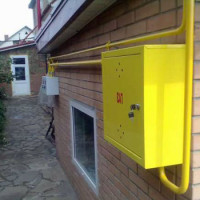 How much does it cost to connect gas to a private house: the price of organizing gas supply
How much does it cost to connect gas to a private house: the price of organizing gas supply  The best washing machines with dryer: model rating and customer tips
The best washing machines with dryer: model rating and customer tips  What is the color temperature of light and the nuances of choosing the temperature of the lamps to suit your needs
What is the color temperature of light and the nuances of choosing the temperature of the lamps to suit your needs 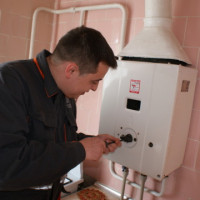 Replacement of a geyser in an apartment: replacement paperwork + basic norms and requirements
Replacement of a geyser in an apartment: replacement paperwork + basic norms and requirements
Hello, I have such a problem: the BOSCH SilencePlus dishwasher, fixed the leak, turn it on, hold it for 4 seconds: it shows e15. I hold the button for 2 seconds: it turns on, I select the program, I start it, the pump works. Then the engine works, but does not start the water. And so the whole program does not show an error.
Good afternoon! Error code E15 in the BOSCH dishwasher indicates a leak. Water has entered the PMM pan. You write that the pump is pumping water and the leak has been fixed, but the electronics still give an error. You need to make sure that there are really no leaks. To do this, tilt the dishwasher forward 45 degrees. If water has poured, then the sensor is working and the machine naturally gives an error - look for and repair the leak.
Water did not pour out, so the leak has been eliminated and the reason for the error is different:
1. Blockage of the drainage system - hose, filter, entry point into the sewer pipe.
2. Hose wear, no breakthrough, but the hose is not tight.
3.Leakage sensor malfunctioning.
You can do the following yourself:
1. Restart the PMM by unplugging the control unit from the wall outlet for 10 seconds, incl. The leak detector will reboot.
2. Clean the blockage with an acidic dishwasher cleaner.
Did the problem go away? So the sensor or hoses need to be replaced.
I undertake to solve only the simplest problems, such as a blockage, improper installation of dishes, etc. Let the master repair everything else. The current technique is too complicated, you can accidentally spoil something with your intervention. Especially if the warranty period has not yet expired. You just need to read the instructions and do everything as written there, do not overload the dishwasher, clean it in time, and everything will be in order.
Hello. Tell E18 - what kind of error?
Hello! Error code E18 indicates problems with draining the water from the tank of the dishwasher. I will briefly talk about the causes of the error and possible ways to resolve them independently:
1) Failure of the electronic control unit. Restart the dishwasher: disconnect from the power supply for 10 minutes, and then turn it on.
2) The water supply hose is pinched. Inspect all hoses connecting the machine to the drainage system, make sure that the hoses are not pinched, not twisted. If the hose is damaged, it must be replaced with a new one.
3) Clogged inlet filter or AquaStop. Launch the dishwasher without dishes, but with special cleaning fluid. If the blockage is not strong, then the chemical will eliminate it. If the blockage is tight, then disassembly of the unit and manual cleaning will be required.
4) Faulty water level sensor. You can independently diagnose and replace the sensor by studying this material.
For the future: all Bosch dishwasher error codes can be found in the instruction manual. In the same place, the manufacturer gives recommendations on how to proceed when the device issues an error.